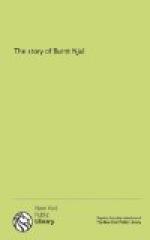“Busk
ye, busk ye,
My
bonny, bonny me,”
he calls on his followers to equip themselves; when they are thus equipped they are “boun”. A bride “busks” herself for the bridal; when she is dressed she is “boun”. In old times a ship was “busked” for a voyage; when she was filled and ready for sea she was “boun”—whence come our outward “bound” and homeward “bound”. These with “redes” for counsels or plans are almost the only words in the translation which are not still in everyday use.
SIR GEORGE DASENT’S INTRODUCTION.
(ABRIDGED).
THE NORTHMEN IN ICELAND.
The men who colonized Iceland towards the end of the ninth century of the Christian aera, were of no savage or servile race. They fled from the overbearing power of the king, from that new and strange doctrine of government put forth by Harold Fairhair, 860-933, which made them the king’s men at all times, instead of his only at certain times for special service, which laid scatts and taxes on their lands, which interfered with vested rights and world-old laws, and allowed the monarch to meddle and make with the freemen’s allodial holdings. As we look at it now, and from another point of view, we see that what to them was unbearable tyranny was really a step in the great march of civilization and progress, and that the centralization and consolidation of the royal authority, according to Charlemagne’s system, was in time to be a blessing to the kingdoms of the north. But to the freeman it was a curse. He fought against it as long as he could; worsted over and over again, he renewed the struggle, and at last, when the isolated efforts, which were the key-stone of his edifice of liberty, were fruitless, he sullenly withdrew from the field, and left the land of his fathers, where,




